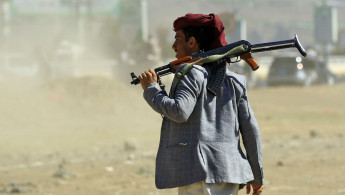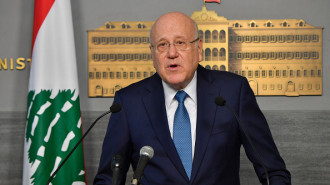Breadcrumb
Red Cross says Yemen prisoner swap hangs in the balance
The prisoner swap agreed in Stockholm in December is seen as a crucial confidence-building measure in the UN-led push to bring the warring sides to negotiations on ending the devastating four-year war.
On Tuesday, the United Nations is hosting another meeting between the warring parties in Jordan to try to agree on the lists of detainees to be released, with the International Committee of the Red Cross (ICRC) set to attend.
ICRC's director of operations Dominik Stillhart told reporters that the agreement on the prisoner exchange is "hanging in the balance," with trust among the parties "insufficient."
Each side has presented a list of up to 8,000 detainees to be freed, but many names cannot be accounted for, said Stillhart, adding that the prisoner swap realistically would involve a significantly lower number.
"There is a lot of disappointment on both sides," said Stillhart. "What we now see on both sides (is that) they don't have them all because a lot of them, they probably died during the conflict."
"The whole discussion now is who will finally be on the lists?" he said.
Distrust is running high between the government, backed by a Saudi-led military coalition, and the rebels, said Stillhart.
"There are expectations that some people on both sides should appear on the list and if they are not, immediately the question is: are you hiding them?" he said.
Extremely fragile Yemen talks
In late January, the Houthi rebels released a Saudi prisoner who was ill in exchange for seven detainees who were flown in to Sanaa by the ICRC.
In August 2015, the sides agreed to exchange seven prisoners each.
Once agreement is reached on the lists, the exchange could happen quickly.
"We have mobilized the logistics, the planes and so on... we are ready to do it," said Stillhart.
UN envoy Martin Griffiths has been working on the prisoner swap since he took up his post as Yemen peacemaker in February 2018.
At the Stockholm talks, the Houthis and the government also agreed on a ceasefire in the flashpoint city of Hodeida and a pullback of forces, but deadlines to implement those measures have slipped.
Stillhart welcomed what he described as "the beginning of a political process," but added that it was "extremely fragile."
The Yemen conflict has triggered what the UN calls the world's worst humanitarian crisis, with millions of people at risk of mass starvation.
The war between the Houthis and troops loyal to the government escalated in March 2015, when President Abedrabbo Mansour Hadi fled to Saudi Arabia and the Riyadh-led coalition intervened.
The World Health Organization has put the death toll since 2015 at about 10,000 people but rights groups say that figure could be five times higher.






![Anthony Blinken speech [Getty] Anthony Blinken speech [Getty]](/sites/default/files/styles/image_684x385/public/media/images/6263436E-8ACD-4D3C-9055-25A7BE79DD5A.jpg?h=d1cb525d&itok=fLHmHCRG)
 Follow the Middle East's top stories in English at The New Arab on Google News
Follow the Middle East's top stories in English at The New Arab on Google News


![Paula Yacoubian was verbally attacked by Salim Aoun during a parliamentary session [Getty]](/sites/default/files/styles/image_330x185/public/1150162486.jpeg?h=b9615360&itok=xysBxMUJ)